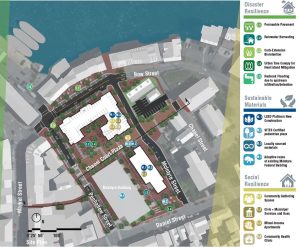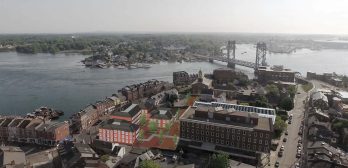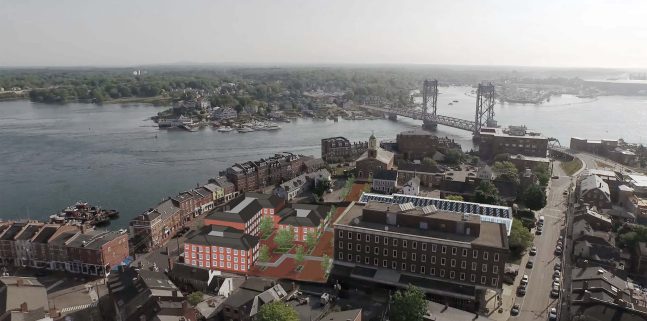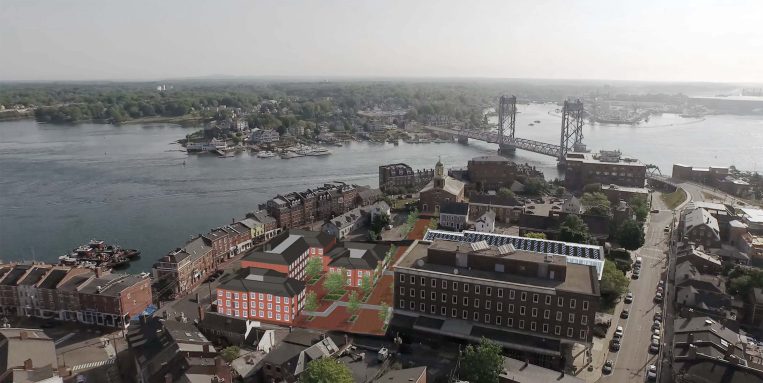What does housing resilience mean in New England? And how can we protect the people in our cities when disaster does strike?
These were key questions that the New Hampshire Chapter of the American Institute of Architects (AIANH) sought to address in their 2018 Emerging Professionals Design Competition. With recent devastations due to hurricanes and tropical storms in the news, AIANH asked their young professionals to consider what could happen if disaster struck the Old Harbor Waterfront in Portsmouth, NH. Recent initiatives have focused on bringing more affordable housing to Portsmouth, with a goal of keeping people working, playing, and living there. With this in mind, AIANH noted that when the population of a city increases, there will be an increased need for protection and preparation. They therefore asked competitors to consider housing resiliency while creating a disaster-resilient community.
 Brian Creamer, a Planner at Nitsch Engineering, took this challenge and ran with it in his award-winning design of the Bow Street Apartments and Community Center project. His vision involved redeveloping the McIntyre Federal Building and adjacent waterfront parcels into a new, vibrant public space. A new building at Bow Street frames the streetscape, opens additional space in front of the existing restaurants and shops on the north side of Bow Street, and creates the community and health clinic spaces that Downtown Portsmouth needs to build its resilience.
Brian Creamer, a Planner at Nitsch Engineering, took this challenge and ran with it in his award-winning design of the Bow Street Apartments and Community Center project. His vision involved redeveloping the McIntyre Federal Building and adjacent waterfront parcels into a new, vibrant public space. A new building at Bow Street frames the streetscape, opens additional space in front of the existing restaurants and shops on the north side of Bow Street, and creates the community and health clinic spaces that Downtown Portsmouth needs to build its resilience.
In awarding Brian first place in the competition, the jury noted that his plan focused on “empowering and celebrating the artisans, architecture, and context that exists in downtown Portsmouth.” They went on to note, “This submission’s main focus was resilience, and whether it was disaster resilience, social resilience, or health resilience, it was apparent that it was community driven. Affordable housing, along with maker-space, a health clinic, green spaces, a disaster-relief master plan and sustainable living … gives this submission the cohesive design that the jury was looking for.”

The Bow Street Apartments and Community Center project would increase social resilience through the creation of equitable housing (60% of units affordable) and a community center with health clinic that serve an existing need for access to healthcare in downtown, as well as improve the disaster resilience of the community by providing a new space for people to access as a safe-harbor in the event of an emergency, or when faced with weather-related stresses caused by our changing climate. The project incorporates low-impact development (LID) strategies such as permeable pavement and bioretention, reutilizes an existing parking deck to support the new building, sites the first floor of the building above the 500-year FEMA flood zone, and mitigates Portsmouth’s most pressing climate problems of flooding, extreme temperatures, and intense precipitation. Brian envisioned the project could be designed to be LEED Platinum Certifiable, achieve SITES Certification, mitigate the urban heat island effect through the use of mature trees, harvest rainwater for reuse, and collect and store stormwater runoff from adjacent sites to make the district water balanced.
Entries were evaluated by a jury of professionals on seven key criteria:
- Strong organizing conceptual principle, both in built form and proposed program.
- Thoughtful consideration of site and context, and integration of transportation in and out of the site.
- Handling of program, from functional concerns to the poetics of experience.
- Demonstration of tectonic expression and architectural image.
- Ability to communicate ideas visually; quality, completion, clarity, effectiveness of presentation and production of high quality work including diagrams, orthographic drawings, three-dimensional renderings, and graphic layouts.
- Inventiveness.
- Representation of a complete architectural project, physically, spiritually and conceptually.
Congratulations to Brian!



